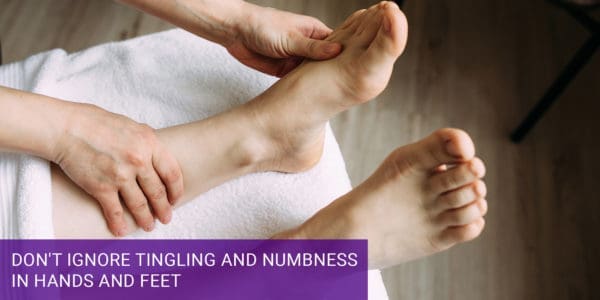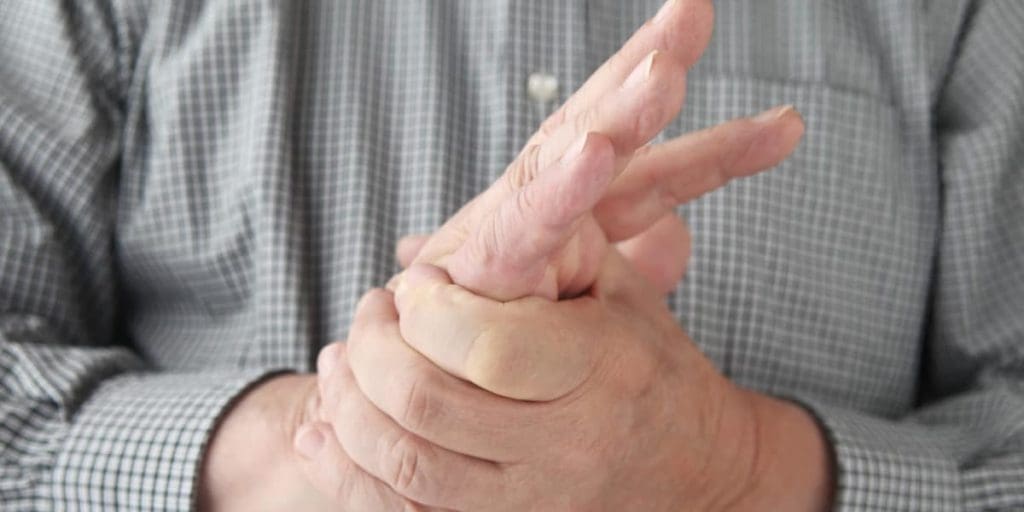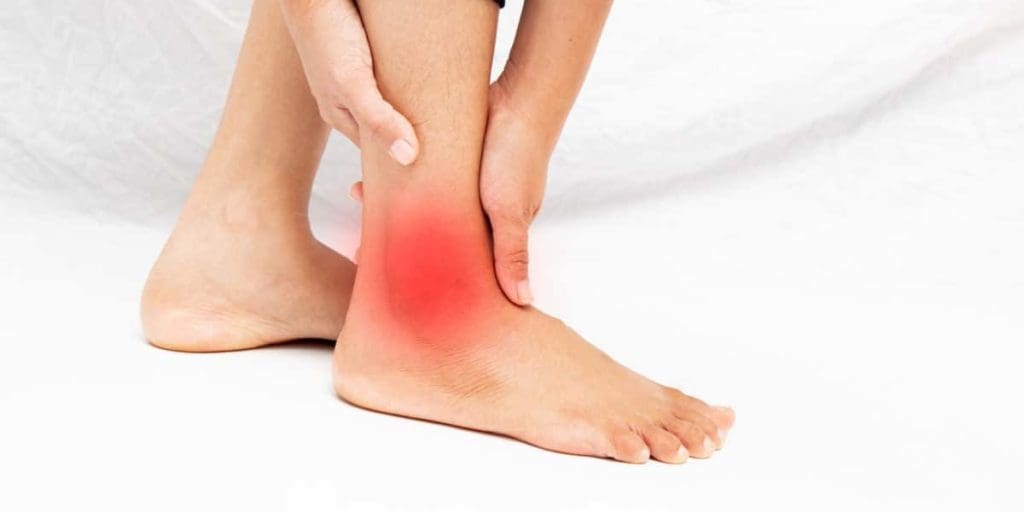
Tingling and Numbness in Your Hands and Feet Overview
If you’ve ever experienced tingling, numbness, and pain in hands and feet (or wrists and elbows), you know it feels a lot worse than it sounds. There are many reasons why you could be having these sensations, so it’s extremely important to identify the potential causes. This is especially true if you have chronic pain because tingling is a symptom for many chronic conditions.
Many people often ask, ‘When should I worry about tingling in my hands?’ The answer depends on accompanying symptoms and their severity.
A personal testimony of pain, tingling and numbness video
Speaking from personal experience, I made the mistake of ignoring unexplainable left foot tingling and numbness. It’s not uncommon for people to experience feet and hands tingling, especially after sitting in one position for too long.
But progressively, it got worse and eventually, the pain, numbness, and tingling moved up my foot and into my left leg. I’ll never know if catching it sooner would’ve prevented my herniated L5. My advice for anyone in a similar situation is to go to the doctor sooner rather than later.
Not all tingling indicates a serious health problem. Sometimes, you may feel nerve pain or experience a lack of nerve function that feels like pins and needles, but persistent tingling in fingers and toes warrants attention. However, once you start moving your limb, the tingling may subside. If this happens, it’s likely due to restricted blood flow. Although it feels awkward and uncomfortable, it’s only temporary.
You may have also had your foot fall asleep before. This may happen when you unknowingly sit or sleep in an odd position. It also resolves itself as soon as you allow blood to flow normally to your extremities.
If you experience unexplainable and frequent tingling and numbness in your hands or feet, read our guide for determining your next steps. We’ll give you some background on tingling, and let you know when it’s time to worry.
Identifying the sensations

A tingling sensation, often described as pins and needles in fingers or toes, can feel like constant pinpricks or a low humming of electricity and constant vibration that’s impossible to ignore. Some even describe it as a zapping sensation that can quickly shift from bearable to painful.
It can be very aggravating and easily disrupt your normal day-to-day activities. We instinctively shake our extremities, sometimes feeling tingling in fingertips, wiggling and moving our toes or fingers in the hopes of increasing circulation. Unfortunately, sometimes that doesn’t work.
Numbness is a more complex feeling. It can be far more concerning as well. If you can’t feel your hands or feet or feel as if you can’t control them, that’s numbness. At the height of my numbness, I couldn’t feel my own hand on my skin when I touched my foot.
What tingling in hand and feet means
Tingling, like experiencing tingling in the right hand, is not as serious as numbness, but it can be uncomfortable and disruptive. In fact, many of the conditions that cause tingling are temporary. If you experience left hand fingers tingling along with numbness, it could be a sign of a nerve issue that shouldn’t be ignored. However, pay careful attention if that tingling is associated with pain.
Peripheral neuropathy, which results from damage to the peripheral nerves, may be causing your tingling. These nerves send signals to your brain about any physical sensations you are feeling. When the nerves are damaged or destroyed, they might send the wrong signals to your brain, making it seem like you are in pain when nothing is causing it.
Many underlying conditions can lead to peripheral neuropathy. Tingling in extremities, including hands and feet, can be a sign of various conditions, ranging from temporary to more serious ones. If you have any of these conditions, speak to a doctor about your symptoms:
- Diabetes
- Alcohol abuse
- Autoimmune diseases, such as rheumatoid arthritis and lupus
- Infections (e.g. Lyme disease, shingles, Epstein-Barr virus, hepatitis, HIV)
- Vitamin deficiencies
In addition, avoid putting pressure on a nerve. Traumas from falls, accidents or sports injuries can damage nerves or cause pinched nerves.
Furthermore, pain combined with tingling and/or numbness is a much more serious matter. Think of it as a warning sign that your body is breaking down in some way. If the pain is severe or chronic, you could have nerve damage that’s preventing normal body function.
Why numbness matters
By itself, occasional numbness may not be serious, because it’s rarely a result of brain and spinal cord problems. But, numbness combined with tingling or pain can indicate carpal tunnel syndrome or a more serious health issue, like multiple sclerosis (MS). In the most extreme instances, you may suffer issues with your central nervous system.
Visit your doctor if you experience numbness – especially combined with tingling and pain – in your hands or feet. Your doctor may need to perform blood tests as well as a physical exam to determine the cause.
If you experience numbness for more than a day or two, don’t ignore it. Talk to your healthcare team. At a minimum, you may have suffered nerve damage. Your body could be on the brink of a much more serious problem like:
- a slipped or herniated dis
- a blood clot
- signs of infection from a previous injury or illness
- a decline in health due to a worsening existing condition
“When stenosis is present in the cervical spine or neck,the symptoms can include neck pain, numbness and tingling in the arm, hand or fingers on the affected side.”
It starts with tingling and numbness
The thing about tingling and numbness in hands and feet – with or without the addition of pain – is it’s often the first symptom for a variety of conditions. It’s your body’s way of getting your attention to let you know something is wrong.
Tingling and numbness are the main indicators of degenerative spinal conditions like osteoarthritis. This degenerative condition is also referred to as spinal stenosis. People suffering from spinal stenosis begin to feel symptoms as their spine worsens. “When stenosis is present in the cervical spine or neck,” says Neel Anand, MD, an orthopedic surgeon specializing in spinal deformity correction at Cedars-Sinai Medical Center in Los Angeles, “the symptoms can include neck pain, numbness and tingling in the arm, hand or fingers on the affected side.”
Similarly, many types of spinal injuries trigger tingling and/or numbness. These include:
- bulging discs
- herniated discs
- spinal tumors
- other spinal injuries
Additional causes of tingling and numbness
Lupus, an autoimmune disease, often reveals itself through numb feelings in the hands or feet. The same symptom of numbness tends to present itself in multiple sclerosis (MS), a chronic, progressive disease that damages nerve cells in the brain and spinal cord.
If you have diabetes, tingling and numbness in the hands and feet can be a sign of diabetic neuropathy, a serious side effect of type 1 and type 2 diabetes that can cause long-term nerve damage. Similarly, if you experience pain, muscle weakness, numbness and tingling in the hands or feet, that can be a sign of kidney disease or worse, kidney failure.
Other potential sneaky triggers that cause tingling and numbness include vitamin deficiencies.
Given the array of symptoms [B12 deficiency symptoms] can cause,” says Patrick J. Skerrett, former editor of the Harvard Health blog, “the condition can be overlooked or confused with something else”. Vitamin B12 deficiency symptoms may include:
- strange sensations, numbness, or tingling in the hands, legs or feet
- difficulty walking (staggering, balance problems)
- anemia
- a swollen, inflamed tongue
- difficulty thinking and reasoning (cognitive difficulties) or memory loss
- weakness
- fatigue
Luckily vitamin deficiencies are treatable. The key is to identify the condition quickly.
download our Pain Management Plan PDF
Prolonged tingling and numbness can be serious concerns. If you suffer from either symptom, please talk to your doctor immediately. She will be able to identify the severity of the problem and offer the best course for treatment.




I’m 42 years old and it been almost a month that I feel numbness and tingling on by both hand everyday ,I did a research in regards to my issue it say I’m lack on vitamin B12 as well as my doctor told me and give me same prescription still nothing happen also do some exercise still the same ,Please let me know what other remedies that I need to know just to get rid of this ….
i feel numbness at my right hand but when i put upward my right hand, the numbness and tingling dis appear…
My mother is 53 yrs old she gets numbness with little pain whenever she wakes up from sleep in her limbs, legs and hands. What could be the cause and whom to consult. Neurologist or some other doctor?
Good question – I’d recommend visiting your mom’s primary care doctor first, who will be able to recommend the best specialist. Wishing her the best and we hope you find the answers you’re looking for soon.
Hello about 3 yrs ago I was in a accident nothing major but abut 3 most later i noticed my hands going numb fast forward to present the pain is almost unbearable it effects my everyday life still going numb but at an immediate pace my thighs are showing signs of numbness I’m pre diabetic any ideas
Hi Tracy,
Your doctor knows your particular health situation best. Please visit your doctor, who will help you get to the root of the issue.
MAREN I’VE BEEN GETTING NUMBNESS AND TINGLING AND PAIN IN MY HANDS. IT’S LIKE MY HANDS ARE FALLING ASLEEP BUT IT HAPPENS DAY AND NIGHT 24/7. IT KEEPS ME UP AT NIGHT IT’S BEEN GOING ON FOR JUST OVER 2 WEEKS NOW IT WAKES ME UP EVERY NIGHT. DO YOU THINK I SHOULD SEE A DOCTOR?
Hi Leah,
I’m sorry to hear that you’ve been experiencing these symptoms. If it is still bothering you, I would recommend getting it checked out by a doctor. He or she will be able to point you in the right direction based on your specific needs.
Your reply is always, “See a doctor”, so what’s the point in asking you for help?
Hi Denise,
I understand your frustration, and it’s important to remember that each person is a unique individual. Everyone has unique conditions that might cause any tingling or numbing sensations in their body. Doctors do not give medical advice without seeing a patient, because they need to have a complete understanding of the person’s medical history, current physical health, medications and more in order to make a proper assessment. When we’re looking for answers, sometimes it requires seeing a doctor – or even multiple doctors – to get to the root of the problem. I wish you the very best with whatever it is that you’re facing, and hope you find the answers that you’re looking for.
I’m really worry, I’m 40 years old, couples weeks ago I woke up in the middle of the night with both hands and feet tingling , also I felt my left side of my face tingling too, I’ be Been with a lot of stress lately due to personal reasons, sometimes I fell it during the day too! What’s should I do?
Hi Eddy,
It sounds like this is something that should be checked out by a doctor. I would recommend scheduling an appointment to get the tingling checked out. Stress can definitely accentuate our medical conditions, but if it’s something that’s waking you up in the middle of the night, it’s a good idea to get a second opinion.
Hi – I’ve been experiencing numbness in my right foot, especially toes (which I was thinking came from wearing high heels on a regular basis) but now it’s in my right hand and my fingers. My fingers and toes get VERY cold which is actually a different sensation than the numbness. What’s happening?!
Hi Susan,
There are many factors that could cause tingling or numbness. If the issue persists, please consult with your primary care doctor, who will be able to guide you in the right direction.
I have started feeling numbness in my left hand all of a sudden and one day has passed still feeling the same.
I am feeling thirsty quite often drinking 8 to 10 lts water a day with not so frequent urination.
I am 23 in age.
Hi John,
Numbness is something to be taken seriously, and I would definitely recommend having your situation checked out by a doctor. Wish you the best and hope you feel better soon.
This site seems useless all it does is refer one to ones doctor, Maren seems to know nothing but refer, why bother to have her,
. Though through her perhaps people who did not know that they can see a doctor now know!!!
Hi Renee,
I’m sorry about your frustration. Sometimes people can find answers about conditions online, and other times the situations are those that need to be checked out by a doctor. Tingling and numbness are typically conditions that should be checked out by a doctor to make sure they aren’t indicative of a larger issue. This is why we typically recommend that people with these symptoms visit a doctor.